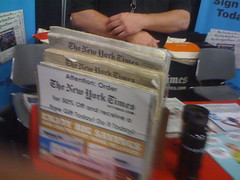If I had to write my economy story in six words, it would be: “A little luck, lots of chutzpah.” We asked for your six-word economy memoir on Twitter and Facebook this week and got some poignant, insightful responses and a few that even made us laugh. Some of them break the six-word rule, but the point comes across loud and clear.
A few of the best:
@jelyon: New 40-something grad, new career, no jobs. Solution? AmeriCorps VISTA.
@Littof Went from owning a 3-bedroom house in L.A. to living rent-free as caretakers of a farmhouse on San Juan Island.
@dpan: 2009: Dual income, then no income, then self-employed. Redefined ‘work,’ created uncertainty, and made life more interesting.
@frugalista: Box hair dye works just fine.
Alan Atwood: Contract Job, no frills life, healthcare albatross.
Denise Bell Philo: Husband returning from two-year military activation to no job!
Howard Kasper: Make change happen – Or Die Trying!
The six-word memoir started a few years ago when Smith Magazine asked for submissions. Since then, the (very) short story idea has taken off, sparking a book and a sequel. NPR reported on the phenomenon in 2008 and created a slideshow of some of the submissions.
What’s your six-word economy story? We’ll be asking for more responses about the economy in the coming weeks, so please continue to share your thoughts.

